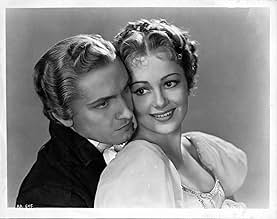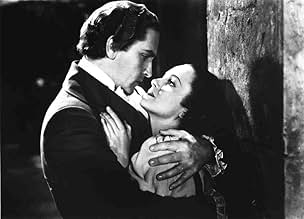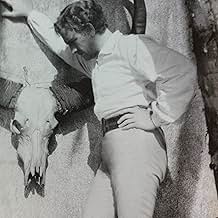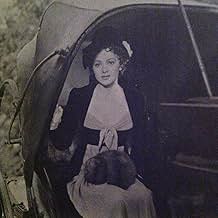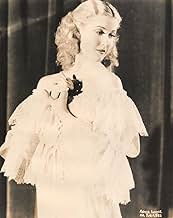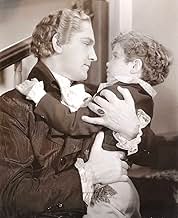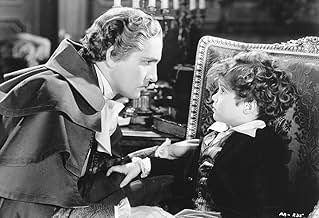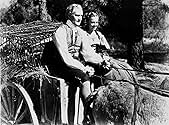AVALIAÇÃO DA IMDb
6,3/10
2,1 mil
SUA AVALIAÇÃO
Adicionar um enredo no seu idiomaIn 18th-century Italy, an orphan's debt to the man who raised him threatens to separate him forever from the woman he loves.In 18th-century Italy, an orphan's debt to the man who raised him threatens to separate him forever from the woman he loves.In 18th-century Italy, an orphan's debt to the man who raised him threatens to separate him forever from the woman he loves.
- Direção
- Roteiristas
- Artistas
- Ganhou 4 Oscars
- 8 vitórias e 3 indicações no total
Avaliações em destaque
Frederic March is "Anthony Adverse" in this 1936 film that also stars Olivia de Havilland, Claude Rains, Anita Louise Gail Sondergaard, Donald Woods, Edmund Gwenn and Louis Hayward.
Anita Louise and Hayward both have small roles as illicit lovers in the beginning of the film - she's married to Marquis de Luis (Claude Rains) and dies giving birth to a son by Denis (Hayward). The evil marquis drops the baby off at a convent, where he lives until he is 10 years old. Then he is adopted by a merchant, Mr. Bonnyfeather (Gwenn), who happens to be his grandfather.
Bonnyfeather sees his daughter in the boy's (Billy Mauch) angelic face. This beautiful little boy grows up to be a blond Frederic March, who has been given the name Anthony Adverse. He's in love with Angela (de Havilland), an aspiring opera singer, but goes to Africa to recover his grandfather's fortune rather than stay with her. There he becomes involved in slave trading. When he returns, things have changed for Angela - and for him.
The film is based on a best-selling book, and I have to agree that both the film and the book seem forgotten today, as is the director, Mervyn Leroy. March is wrong for the role - he doesn't convey enough charisma, for one thing - certainly Brian Aherne or Errol Flynn would have been much more compelling. March was a wonderful actor but he needed a strong director to get him away from being "stagy," and this type of role was never his métier anyway.
The gorgeous ingénue de Havilland gives a lovely performance, but the standouts are the villains - Sondergaard, as Bonnyfeather's housekeeper and Claude Rains as the marquis.
TCM gives this movie very high stars, probably based on the fact that it won four Oscars (one for Sondergaard who doesn't do much but look snide) and that it was nominated for Best Picture in 1936. The pickings must have been slim.
This is a good film, with an exciting carriage chase in the mountains and some brutal scenes of slave trading, but it's hard to keep interested in it. Adverse isn't terribly likable, for one thing. It's the story of a man and how he is molded into a human being by two priests and a woman. It's a lofty idea that doesn't quite make it onto the screen.
Anita Louise and Hayward both have small roles as illicit lovers in the beginning of the film - she's married to Marquis de Luis (Claude Rains) and dies giving birth to a son by Denis (Hayward). The evil marquis drops the baby off at a convent, where he lives until he is 10 years old. Then he is adopted by a merchant, Mr. Bonnyfeather (Gwenn), who happens to be his grandfather.
Bonnyfeather sees his daughter in the boy's (Billy Mauch) angelic face. This beautiful little boy grows up to be a blond Frederic March, who has been given the name Anthony Adverse. He's in love with Angela (de Havilland), an aspiring opera singer, but goes to Africa to recover his grandfather's fortune rather than stay with her. There he becomes involved in slave trading. When he returns, things have changed for Angela - and for him.
The film is based on a best-selling book, and I have to agree that both the film and the book seem forgotten today, as is the director, Mervyn Leroy. March is wrong for the role - he doesn't convey enough charisma, for one thing - certainly Brian Aherne or Errol Flynn would have been much more compelling. March was a wonderful actor but he needed a strong director to get him away from being "stagy," and this type of role was never his métier anyway.
The gorgeous ingénue de Havilland gives a lovely performance, but the standouts are the villains - Sondergaard, as Bonnyfeather's housekeeper and Claude Rains as the marquis.
TCM gives this movie very high stars, probably based on the fact that it won four Oscars (one for Sondergaard who doesn't do much but look snide) and that it was nominated for Best Picture in 1936. The pickings must have been slim.
This is a good film, with an exciting carriage chase in the mountains and some brutal scenes of slave trading, but it's hard to keep interested in it. Adverse isn't terribly likable, for one thing. It's the story of a man and how he is molded into a human being by two priests and a woman. It's a lofty idea that doesn't quite make it onto the screen.
Wrongheaded critics:
There are more than one user reviews posted here including one that says the film should get zero stars because it deals with slavery. I think such an attitude about a movie that was made at any time let alone the 1930s is absurd. Are they supposed to pretend that slavery in the 1700s somehow did not exist and that many many people were involved in this trade? It's idiotic. The film clearly shows that there were those risking their lives in opposition to the slave trade and that there were others who were corrupted by the wealth and power that they gained from it. So to those pretentious and moralistic critics, I say get off your self righteous high horse and look at this film and all others in its proper historical context.
Fredric March stars as the title character, an orphan boy discarded due to his illegitimacy, who overcomes much adversity throughout his life. He is raised in a convent and adopted by a wealthy merchant, Edmund Gwenn, at the age of ten. He learns the business, but is shipped to Havana around the time of the French Revolution. Before he departs, it is learned that he has married the daughter of a servant, Olivia DeHavilland. He is thought lost at sea by all, but is actually in Africa running a slave trade, with his heart blackening the whole time. From there, the tale takes many twists as Anthony must find goodness in his heart again, and DeHavilland may be the key. The drama is a bit heavy-handed and some overacting is present. Claude Rains and Gale Sondergaard make great antagonists, and Sondergaard won a Best Supporting Actress Oscar for her performance.
I just watched the Warner Archive DVD-R of this movie last night. I want to say that it is a good movie and much underrated by the IMDb score of 6.6. It deserves at least a 7.6; I give it an 8.
It is beautifully filmed, the sets are gorgeous, and the cast of actors is stellar and does a good job with the material. Even the players with smaller roles are well-known actors, and they deliver their short moments with just the right emphasis. If you're an old film fan, you can't watch the movie without seeing a score of faces that you know and love.
The two main complaints I see here are that Fredric March is too old to play a convincing lover for De Havilland, and that the movie is somewhat pedestrian and dragging.
On the first point, yes, in some scenes the age difference in visible, but in others, March is made up to look younger than his biological age, and is convincing as a younger man. But the key thing is that March is *good* in the role. If you overlook the physical signs of his age, and concentrate on his characterization, delivery, etc., you can see he is acting thoughtfully, trying to do justice to his complex character. I think it's an excellent performance.
Pedestrian and dragged-out? Well, the film is long, as these epic-type films tend to be. Yet I did not find that my interest flagged. The film deals with years of the lives of these characters, and it needs to be long to get in all the complex background of European history and the changes in the lives of the characters (not to mention the important back-story of Anthony's birth).
One more thing: some commenters thought that Gale Sondergaard did little to earn her Oscar for this one. I thought she was very good. Normally she plays the sinister villainess in a very broad manner that telegraphs how evil and sinister she is; in fact, she was often hired because she was so good at that kind of thing (see her many Universal horror and mystery films). Here, she shows a bit of that sinister character, but underplays it greatly, to very good effect. She would never have earned an Oscar had she played the role in her heavy Universal style. I think it's the subtlest performance I've seen her give.
The sound on the Archives DVD-R is at first a tiny bit harsh, especially the booming orchestra with the grand Korngold score; this I noticed especially near the beginning of the film, and was worried it would spoil the film for me. However, the sound seemed to become a bit gentler about 10 or 15 minutes into the movie -- or maybe I just got used to it. But the volume of characters's speeches was definitely a bit uneven in the first few minutes. That happens, with movies this old. Perfect prints are rare, and DVDs reflect the imperfections. Overall, however, the DVD was quite watchable and the audio was clear and adequate.
I recommend this as a historical epic. Not one the greatest epics, to be sure, but quite a good one, and admirably executed. Maybe not a must-see, but certainly nothing you will regret seeing. I will watch it more than once, I think.
It is beautifully filmed, the sets are gorgeous, and the cast of actors is stellar and does a good job with the material. Even the players with smaller roles are well-known actors, and they deliver their short moments with just the right emphasis. If you're an old film fan, you can't watch the movie without seeing a score of faces that you know and love.
The two main complaints I see here are that Fredric March is too old to play a convincing lover for De Havilland, and that the movie is somewhat pedestrian and dragging.
On the first point, yes, in some scenes the age difference in visible, but in others, March is made up to look younger than his biological age, and is convincing as a younger man. But the key thing is that March is *good* in the role. If you overlook the physical signs of his age, and concentrate on his characterization, delivery, etc., you can see he is acting thoughtfully, trying to do justice to his complex character. I think it's an excellent performance.
Pedestrian and dragged-out? Well, the film is long, as these epic-type films tend to be. Yet I did not find that my interest flagged. The film deals with years of the lives of these characters, and it needs to be long to get in all the complex background of European history and the changes in the lives of the characters (not to mention the important back-story of Anthony's birth).
One more thing: some commenters thought that Gale Sondergaard did little to earn her Oscar for this one. I thought she was very good. Normally she plays the sinister villainess in a very broad manner that telegraphs how evil and sinister she is; in fact, she was often hired because she was so good at that kind of thing (see her many Universal horror and mystery films). Here, she shows a bit of that sinister character, but underplays it greatly, to very good effect. She would never have earned an Oscar had she played the role in her heavy Universal style. I think it's the subtlest performance I've seen her give.
The sound on the Archives DVD-R is at first a tiny bit harsh, especially the booming orchestra with the grand Korngold score; this I noticed especially near the beginning of the film, and was worried it would spoil the film for me. However, the sound seemed to become a bit gentler about 10 or 15 minutes into the movie -- or maybe I just got used to it. But the volume of characters's speeches was definitely a bit uneven in the first few minutes. That happens, with movies this old. Perfect prints are rare, and DVDs reflect the imperfections. Overall, however, the DVD was quite watchable and the audio was clear and adequate.
I recommend this as a historical epic. Not one the greatest epics, to be sure, but quite a good one, and admirably executed. Maybe not a must-see, but certainly nothing you will regret seeing. I will watch it more than once, I think.
I rented a tape of Anthony Adverse mainly to see what kind of performance the Academy was looking for in the first-awarded "best supporting actress" category. Gale Sondergaard's time on camera was actually quite brief and her villainous role required a strictly one-dimensional reading. There were no subtleties whatsoever, nor was there any need in the film for them. Ordinarily, it might seem surprising that her part would receive any attention at all, not to mention a prestigious award, but keeping in mind that Oscars in those days were to a large extent self-congratulatory spectacles passed around from studio to studio year by year, it really isn't surprising.
The film was long and episodic, as was the novel, and not particularly good at that. There was the glitz we've come to expect of course with the duels and chases thrown in for good measure. I kept wondering if the novel was written with Hollywood in mind. It's hardly readable nowadays. As far as directorial touches are concerned, it's no wonder that Mervyn LeRoy has long disappeared from anyone's pantheon. The kiddie-car version of France must have excited the Depression audiences. The film is very long and very expensive so perhaps there's something to say about that.
The film was long and episodic, as was the novel, and not particularly good at that. There was the glitz we've come to expect of course with the duels and chases thrown in for good measure. I kept wondering if the novel was written with Hollywood in mind. It's hardly readable nowadays. As far as directorial touches are concerned, it's no wonder that Mervyn LeRoy has long disappeared from anyone's pantheon. The kiddie-car version of France must have excited the Depression audiences. The film is very long and very expensive so perhaps there's something to say about that.
Você sabia?
- CuriosidadesGale Sondergaard made her film debut in "Anthony Adverse" and won an Academy Award in the brand-new category of Best Supporting Actress.
- Erros de gravaçãoDuring the duel between Don Luis and Denis Moore, the sword wielded by Moore was "unbated", i.e. his fencing foil was blunted with a protective guard on the tip.
- Citações
[first title card]
Title Card: Those who are destined to live during times of war and social upheaval are victims of cruel fate ~~ unable to find comfort in the past or peace in the present. They are the spiritual orphans of the world.
- ConexõesFeatured in The Making of a Great Motion Picture (1936)
- Trilhas sonorasI'll Wait For You My Love (Angela's Song)
(uncredited)
Composer: Erich Wolfgang Korngold
Lyrics by Howard Koch (uncredited)
Sung by Carol Ellis (uncredited)
Principais escolhas
Faça login para avaliar e ver a lista de recomendações personalizadas
- How long is Anthony Adverse?Fornecido pela Alexa
Detalhes
- Data de lançamento
- País de origem
- Idiomas
- Também conhecido como
- Anthony Adverse
- Locações de filme
- Empresa de produção
- Consulte mais créditos da empresa na IMDbPro
Bilheteria
- Orçamento
- US$ 1.050.500 (estimativa)
- Tempo de duração2 horas 21 minutos
- Cor
- Mixagem de som
- Proporção
- 1.37 : 1
Contribua para esta página
Sugerir uma alteração ou adicionar conteúdo ausente



